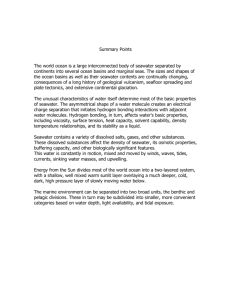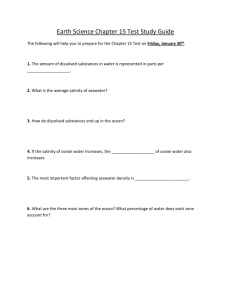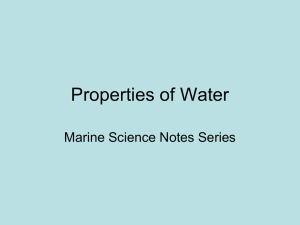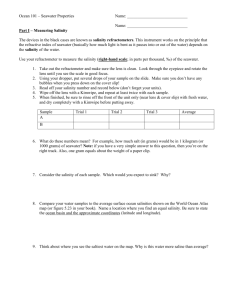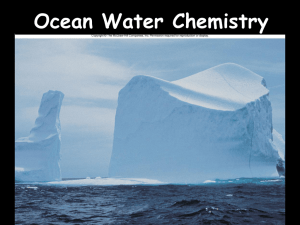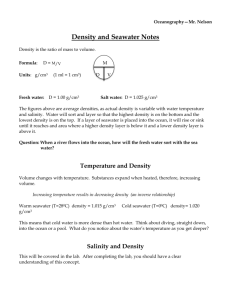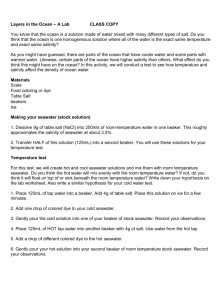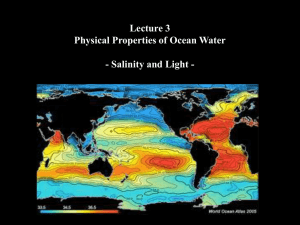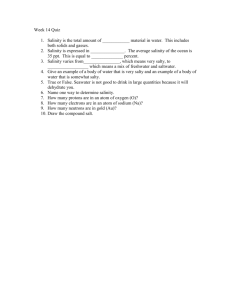Chapter 5 Vocabulary and Analytical Reading Questions
advertisement
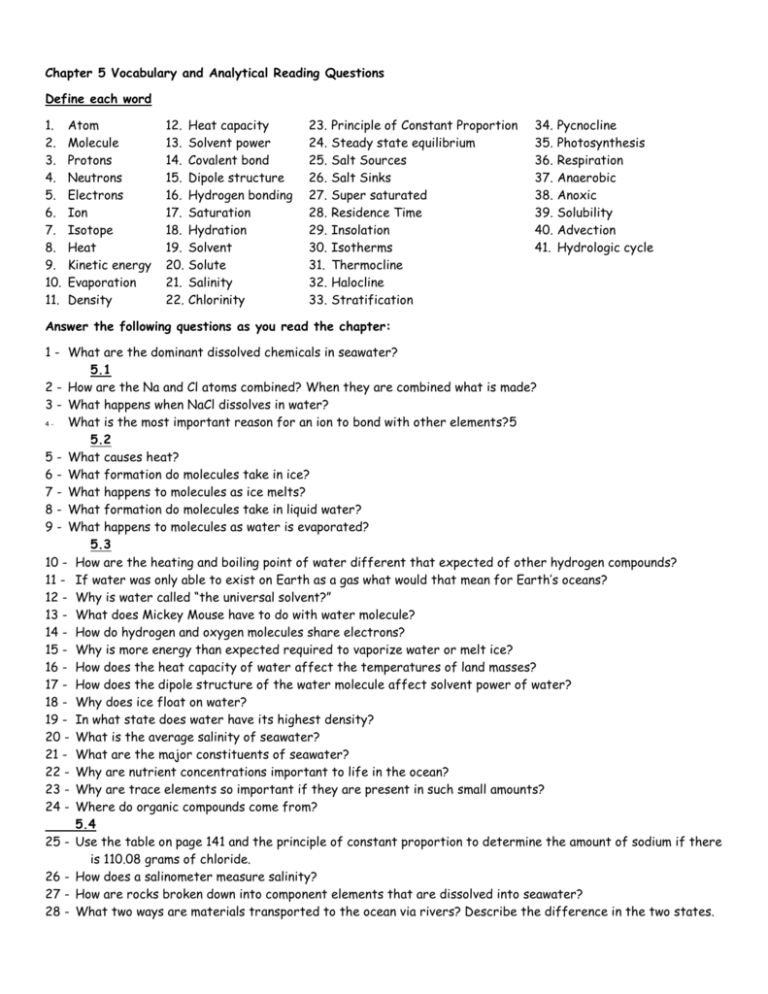
Chapter 5 Vocabulary and Analytical Reading Questions Define each word 1. 2. 3. 4. 5. 6. 7. 8. 9. 10. 11. Atom Molecule Protons Neutrons Electrons Ion Isotope Heat Kinetic energy Evaporation Density 12. 13. 14. 15. 16. 17. 18. 19. 20. 21. 22. Heat capacity Solvent power Covalent bond Dipole structure Hydrogen bonding Saturation Hydration Solvent Solute Salinity Chlorinity 23. 24. 25. 26. 27. 28. 29. 30. 31. 32. 33. Principle of Constant Proportion Steady state equilibrium Salt Sources Salt Sinks Super saturated Residence Time Insolation Isotherms Thermocline Halocline Stratification 34. 35. 36. 37. 38. 39. 40. 41. Pycnocline Photosynthesis Respiration Anaerobic Anoxic Solubility Advection Hydrologic cycle Answer the following questions as you read the chapter: 1 - What are the dominant dissolved chemicals in seawater? 5.1 2 - How are the Na and Cl atoms combined? When they are combined what is made? 3 - What happens when NaCl dissolves in water? 4What is the most important reason for an ion to bond with other elements?5 5.2 5 - What causes heat? 6 - What formation do molecules take in ice? 7 - What happens to molecules as ice melts? 8 - What formation do molecules take in liquid water? 9 - What happens to molecules as water is evaporated? 5.3 10 - How are the heating and boiling point of water different that expected of other hydrogen compounds? 11 - If water was only able to exist on Earth as a gas what would that mean for Earth’s oceans? 12 - Why is water called “the universal solvent?” 13 - What does Mickey Mouse have to do with water molecule? 14 - How do hydrogen and oxygen molecules share electrons? 15 - Why is more energy than expected required to vaporize water or melt ice? 16 - How does the heat capacity of water affect the temperatures of land masses? 17 - How does the dipole structure of the water molecule affect solvent power of water? 18 - Why does ice float on water? 19 - In what state does water have its highest density? 20 - What is the average salinity of seawater? 21 - What are the major constituents of seawater? 22 - Why are nutrient concentrations important to life in the ocean? 23 - Why are trace elements so important if they are present in such small amounts? 24 - Where do organic compounds come from? 5.4 25 - Use the table on page 141 and the principle of constant proportion to determine the amount of sodium if there is 110.08 grams of chloride. 26 - How does a salinometer measure salinity? 27 - How are rocks broken down into component elements that are dissolved into seawater? 28 - What two ways are materials transported to the ocean via rivers? Describe the difference in the two states. 29 30 31 32 33 34 35 36 37 38 39 40 41 42 43 44 45 46 47 48 49 50 51 52 53 54 55 56 57 58 59 60 61 62 63 64 65 66 - How much material is input into the ocean via rivers each year? How long have oceans existed on earth? What inorganic process causes a salt sink? What organic process causes a salt sink? How do organisms help maintain the stead-state equilibrium of the ocean’s salinity? If rivers bring salt to the ocean why is river water not salty? 5.5 How does latitude affect the surface temperature of the ocean? How do ocean currents change ocean temperatures with latitude? What processes remove water molecules form seawater? What happens to seawater when water molecules are removed? Why does salinity vary with latitude? Where are maximum salinity values located on earth? Where are minimum salinity values located on earth? How does rainfall and evaporation affect salinity at the equator? Describe water stratification between 40 degrees North and 40 south latitudes. What happens to water once it sinks below 2km? What two factors affect the density of seawater most strongly? What would make it possible for high salinity water to lie above low salinity seawater? Describe the three layer structure of the ocean? 5.6 What two factors affect the solubility of gases in seawater? Which can dissolve more gas: cool brackish water or warm high salinity water? How does wave and current turbulence affect concentration of gasses in seawater? How does temperature affect concentration of gasses in seawater? How does salinity affect concentration of gasses in seawater? How does pressure affect concentration of gasses in seawater? How does photosynthesis affect concentration of gasses in seawater? How does decomposition of organisms affect concentration of gasses in seawater? How does acidity affect concentration of gasses in seawater? What are the two principle sources of oxygen in the ocean? Why is oxygen concentration higher below the pycnocline? Use figure 5-17 to describe the oxygen minimum layer. How is CO2 involved in the process of photosynthesis? How does CO2 control acidity in seawater? How does the pH of seawater differ from pure water? 5.7 Why is the atmosphere so important to the Earth’s oceans? Use table 5-10 to make a histogram of the Earth’s water reservoirs. Since evaporation exceed precipitation over the ocean how is the balance of water maintained? What is meant when the ocean is called a “biogeochemical system?” (Consult #8 on page 180)
